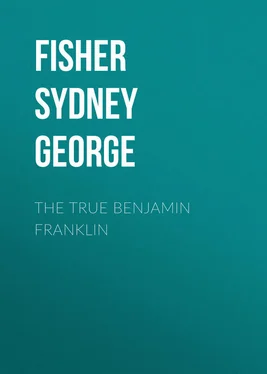Sydney Fisher - The True Benjamin Franklin
Здесь есть возможность читать онлайн «Sydney Fisher - The True Benjamin Franklin» — ознакомительный отрывок электронной книги совершенно бесплатно, а после прочтения отрывка купить полную версию. В некоторых случаях можно слушать аудио, скачать через торрент в формате fb2 и присутствует краткое содержание. Жанр: История, foreign_antique, foreign_prose, Биографии и Мемуары, на английском языке. Описание произведения, (предисловие) а так же отзывы посетителей доступны на портале библиотеки ЛибКат.
- Название:The True Benjamin Franklin
- Автор:
- Жанр:
- Год:неизвестен
- ISBN:нет данных
- Рейтинг книги:4 / 5. Голосов: 1
-
Избранное:Добавить в избранное
- Отзывы:
-
Ваша оценка:
- 80
- 1
- 2
- 3
- 4
- 5
The True Benjamin Franklin: краткое содержание, описание и аннотация
Предлагаем к чтению аннотацию, описание, краткое содержание или предисловие (зависит от того, что написал сам автор книги «The True Benjamin Franklin»). Если вы не нашли необходимую информацию о книге — напишите в комментариях, мы постараемся отыскать её.
The True Benjamin Franklin — читать онлайн ознакомительный отрывок
Ниже представлен текст книги, разбитый по страницам. Система сохранения места последней прочитанной страницы, позволяет с удобством читать онлайн бесплатно книгу «The True Benjamin Franklin», без необходимости каждый раз заново искать на чём Вы остановились. Поставьте закладку, и сможете в любой момент перейти на страницу, на которой закончили чтение.
Интервал:
Закладка:
Sydney George Fisher
The True Benjamin Franklin
Preface
This analysis of the life and character of Franklin has in view a similar object to that of the volume entitled “The True George Washington,” which was prepared for the publishers by Mr. Paul Leicester Ford and issued a year or two ago.
Washington sadly needed to be humanized, to be rescued from the myth-making process which had been destroying all that was lovable in his character and turning him into a mere bundle of abstract qualities which it was piously supposed would be wholesome examples for the American people. This assumption that our people are children who must not be told the eternal truths of human nature, but deceived into goodness by wooden heroes and lay figures, seems, fortunately, to be passing away, and in a few years it will be a strange phase to look back upon.
So thorough and systematic has been the expurgating during the last century that some of its details are very curious. It is astonishing how easily an otherwise respectable editor or biographer can get himself into a state of complete intellectual dishonesty. It is interesting to follow one of these literary criminals and see the minute care with which he manufactures an entirely new and imaginary being out of the real man who has been placed in his hands. He will not allow his victim to say even a single word which he considers unbecoming. The story is told that Washington wrote in one of his letters that a certain movement of the enemy would not amount to a flea-bite; but one of his editors struck out the passage as unfit to be printed. He thought, I suppose, that Washington could not take care of his own dignity.
Franklin in his Autobiography tells us that when working as a journeyman printer in London he drank nothing but water, and his fellow-workmen, in consequence, called him the “Water-American;” but Weems in his version of the Autobiography makes him say that they called him the “American Aquatic,” an expression which the vile taste of that time was pleased to consider elegant diction. In the same way Temple Franklin made alterations in his grandfather’s writings, changing their vigorous Anglo-Saxon into stilted Latin phrases.
It is curious that American myth-making is so unlike the ancient myth-making which as time went on made its gods and goddesses more and more human with mortal loves and passions. Our process is just the reverse. Out of a man who actually lived among us and of whose life we have many truthful details we make an impossible abstraction of idealized virtues. It may be said that this could never happen among a people of strong artistic instincts, and we have certainly in our conceptions of art been theatrical and imitative rather than dramatic and real. Possibly the check which is being given to our peculiar myth-making is a favorable sign for our art.
The myth-makers could not work with Franklin in quite the same way that they worked with Washington. With Washington they ignored his personal traits and habits, building him up into a cold military and political wonder. But Franklin’s human side would not down so easily. The human in him was so interlaced with the divine that the one dragged the other into light. His dramatic and artistic sense was very strong, far stronger than in most distinguished Americans; and he made so many plain statements about his own shortcomings, and followed pleasure and natural instincts so sympathetically, broadly, and openly, that the efforts to prepare him for exhibition are usually ludicrous failures.
But the eulogists soon found an effective way to handle him. Although they could ignore certain phases of his character only so far as the genial old fellow would let them, they could exaggerate the other phases to an almost unlimited extent; for his career was in many ways peculiarly open to exaggeration. It was longer, more varied, and more full of controversy than Washington’s. Washington was twenty-six years younger than Franklin and died at the age of sixty-seven, while Franklin lived to be eighty-four. Washington’s important public life was all covered by the twenty-two years from 1775 to 1797, and during more than three of those years he was in retirement at Mount Vernon. But Franklin was an active politician, philosopher, man of science, author, philanthropist, reformer, and diplomat for the forty-odd years from 1745 to 1788.
Almost every event of his life has been distorted until, from the great and accomplished man he really was, he has been magnified into an impossible prodigy. Almost everything he wrote about in science has been put down as a discovery. His wonderful ability in expressing himself has assisted in this; for if ten men wrote on a subject and Franklin was one of them, his statement is the one most likely to be preserved, because the others, being inferior in language, are soon forgotten and lost.
Every scrap of paper he wrote upon is now considered a precious relic and a great deal of it is printed, so that statements which were but memoranda or merely his way of formulating other men’s knowledge for his own convenience or for the sake of writing a pleasant letter to a friend, are given undue importance. Indeed, when we read one of these letters or memoranda it is so clearly and beautifully expressed and put in such a captivating form that, as the editor craftily forbears to comment on it, we instinctively conclude that it must have been a gift of new knowledge to mankind.
The persistency with which people have tried to magnify Franklin is curiously shown in the peculiar way in which James Logan’s translation of Cicero’s essay on old age was attributed to him. This translation with notes and a preface was made by Logan and printed in 1744 by Franklin in his Philadelphia printing-office, and at the foot of the title-page Franklin’s name appeared as the printer. In 1778 the book was reprinted in London, with Franklin’s name on the title-page as the translator. In 1809 one of his editors, William Duane, actually had this translation printed in his edition of Franklin’s works. The editor was afterwards accused of having done this with full knowledge that the translation had not been made by Franklin; but, under the code of literary morals which has so long prevailed, I suppose he would be held excusable.
One of Franklin’s claims to renown is that he was a self-made man, the first distinguished American who was created in that way; and it would seem, therefore, all the more necessary that he should be allowed to remain as he made himself. I have endeavored to act upon this principle and so far as possible to let Franklin speak for himself. The analytical method of writing a man’s life is well suited to this purpose. There are already chronological biographies of Franklin in two volumes or more giving the events in order with very full details from his birth to his death. The present single volume is more in the way of an estimate of his position, worth, and work, and yet gives, I believe, every essential fact of his career with enough detail to enable the reader to appreciate it. At the same time the chapters have been arranged with such regard to chronological order as to show the development of character and achievement from youth to age.
I
PHYSICAL CHARACTERISTICS
Franklin was a rather large man, and is supposed to have been about five feet ten inches in height. In his youth he was stout, and in old age corpulent and heavy, with rounded shoulders. The portraits of him reveal a very vigorous-looking man, with a thick upper arm and a figure which, even in old age, was full and rounded. In fact, this rounded contour is his most striking characteristic, as the angular outline is the characteristic of Lincoln. Franklin’s figure was a series of harmonious curves, which make pictures of him always pleasing. These curves extended over his head and even to the lines of his face, softening the expression, slightly veiling the iron resolution, and entirely consistent with the wide sympathies, varied powers, infinite shrewdness, and vast experience which we know he possessed.
Читать дальшеИнтервал:
Закладка:
Похожие книги на «The True Benjamin Franklin»
Представляем Вашему вниманию похожие книги на «The True Benjamin Franklin» списком для выбора. Мы отобрали схожую по названию и смыслу литературу в надежде предоставить читателям больше вариантов отыскать новые, интересные, ещё непрочитанные произведения.
Обсуждение, отзывы о книге «The True Benjamin Franklin» и просто собственные мнения читателей. Оставьте ваши комментарии, напишите, что Вы думаете о произведении, его смысле или главных героях. Укажите что конкретно понравилось, а что нет, и почему Вы так считаете.









![Benjamin Franklin - Memoirs of Benjamin Franklin; Written by Himself. [Vol. 2 of 2]](/books/747975/benjamin-franklin-memoirs-of-benjamin-franklin-wr-thumb.webp)
![Benjamin Franklin - Memoirs of Benjamin Franklin; Written by Himself. [Vol. 1 of 2]](/books/748053/benjamin-franklin-memoirs-of-benjamin-franklin-wr-thumb.webp)

